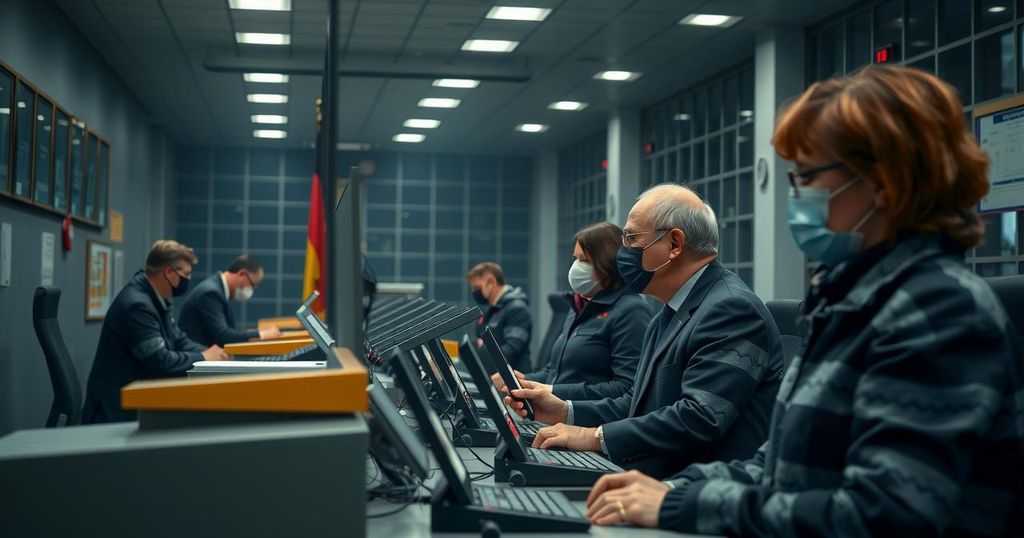World news
ANGELA MERKEL, ASIA, BUNDESTAG, CHINA, CHRISTIAN DEMOCRATIC UNION, CHRISTIAN SOCIAL UNION, DEFENSE SPENDING, DEMONSTRATIONS, EUROPE, EUROPE/ASIA, EUROPEAN UNION, GAZA, GAZA STRIP, GERMANY, ISRAEL, MEXICO, NORTH AMERICA, OLAF SCHOLZ, POLITICS, RUSSIA, SCHOLZ, SPD, STEINMEIER, UKRAINE, UNITED STATES, US PRESIDENTIAL ELECTION, WALTER STEINMEIER
Stella Nguyen
0 Comments
Germany Prepares for Snap Elections on February 23 Amid Political Crisis
Germany will hold snap elections on February 23 after Chancellor Olaf Scholz’s coalition collapsed. The decision, influenced by economic pressures and political negotiations, comes after a looming confidence vote. The elections will occur amid concerns over the political stability in Germany and the EU’s unity in addressing external challenges, particularly in light of Trump’s election in the U.S.
Germany is poised to conduct snap elections on February 23, following the disintegration of Chancellor Olaf Scholz’s three-party coalition. This decision, reached by the leading political parties, reflects negotiations between the conservative opposition, which advocated for a January election, and Scholz, who sought to delay until mid-March for organizational reasons. The timeline is dependent on an impending confidence vote on December 16, which Scholz is anticipated to lose, initiating a chain of events that will lead to the dissolution of the Bundestag, Germany’s lower house of parliament, within 21 days as directed by President Frank-Walter Steinmeier. The backdrop for this political upheaval is Germany’s economic struggles, exacerbated by inflation, the ramifications of Russia’s ongoing conflict in Ukraine, and challenges posed by an increasingly competitive international landscape. The economy has been forecasted to shrink for a consecutive year, driving the need for stable governance. Scholars and political analysts suggest that the resulting leadership vacuum in Germany could impede the European Union’s efforts to present a cohesive front on critical issues such as NATO and foreign diplomacy, particularly with Donald Trump’s return to power in the United States. Scholz, who assumed office in late 2021, has witnessed a tumultuous political journey characterized by factional strife over fiscal policy, culminating in the departure of the Free Democratic Party (FDP) from his administration. This incident coincided with Trump’s election victory in the U.S., further complicating Germany’s political environment. The rise of the far-right Alternative for Germany (AfD) party presents another challenge, as public sentiment regarding immigration has contributed to their growing popularity, although the mainstream parties have committed to excluding them from future coalitions. As the country moves toward these anticipated elections, the Social Democratic Party (SPD), which is lagging in the polls, has expressed unyielding support for Chancellor Scholz, despite suggestions to consider alternative candidates. The upcoming election will test party dynamics, electorate engagement in the mounting cold of winter, and the overarching need for economic and political stability in Germany amidst its current challenges.
The context surrounding the upcoming snap elections in Germany is marked by political fragmentation and economic pressures. Chancellor Olaf Scholz’s government, formed from a coalition involving the Social Democrats, Greens, and the Free Democratic Party, fell apart due to irreconcilable differences on fiscal matters. As Germany grapples with significant economic challenges linked to external and internal factors, the elections aim to restore stability within its governance structure. Furthermore, the evolving political landscape poses significant implications for the European Union, as Germany’s leadership solidity often influences collective European strategies.
In summary, Germany’s preparation for snap elections on February 23 emerges from the breakdown of a three-party coalition led by Chancellor Olaf Scholz. The context of economic turmoil and shifting political tides necessitates a return to stable governance. Amidst rising political extremism and the implications of foreign policy on domestic affairs, the electorate’s response to upcoming campaigns will be pivotal in determining the future political landscape of not just Germany, but the broader European environment.
Original Source: www.aljazeera.com




Post Comment